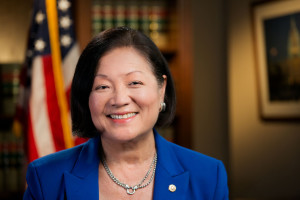US senators urge Trump to continue WWII Filvets’ reunification with families

Senators Mazie K. Hirono (D-Hawaii), with four other Democratic senators, sent a letter to President Trump urging the continuation of the Filipino veterans of WWII family reunification program instituted by the Obama administration.
WASHINGTON, DC – Five Democratic senators urged President Donald Trump to continue the implementation of the Filipino World War II Veterans Parole Program (FWVP) program, which reunites Filipino veterans who fought for the United States during World War II with their families.
Senators Mazie K. Hirono (D-Hawaii), Dianne Feinstein (D-California), Tim Kaine (D-Virginia), Catherine Cortez Masto (D-Nevada), and Kamala Harris (D-California) wrote to the president in response to reports that the administration is reviewing immigration parole programs.
“Today, there are less than six thousand surviving Filipino World War II veterans in the United States,” the Senators wrote. “Like most elderly Americans, these veterans are likely to become more reliant on family members for care as they grow older. However, because the current family-based immigrant visa backlog extends back more than 20 years, these family members have not been able to reunite with their relatives in the United States.
“We know you understand the contributions and sacrifices that these veterans and their families have made to our country. Therefore, we hope that USCIS will continue its full implementation of the FWVP policy uninterrupted and that you work to address the needs of these veterans.”
Waiting for decades
Filipino veterans were granted citizenship in recognition of their service to the United States during World War II. Many of their children, however, were not. Due to backlogs in the U.S. immigration system, it can take more than 20 years for a visa to become available. Under the FWVP program, families, some of whom have been waiting decades, can finally be together in the United States while they wait for a green card.
Senator Hirono has been the leader in Congress of the effort to reunite Filipino World War II veterans with their families. After years of advocacy by Hirono, the Obama Administration announced in May 2016 that it would create a parole program to reunite the families of Filipino World War II veterans. Last February, Hirono met with the Milla family, the first Hawaii beneficiaries of the FWVP program.
“The Humanitarian Parole of the FWVP Policy that allowed Family Members to come to the U.S. and be reunited while waiting for their visa’s availability is a relief for the family,” Gaspar Milla, son of Filipino World War II veteran Jesus Milla said.
“We hope the USCIS will continue its full implementation of this FWVP Parole Program to acknowledge the heroism of these Filipino Veterans under the command of American Military during WWII. They should be more considerate since most of them are now in poor health condition; consequently, the elderly tend to be more at high risk of developing disabilities and contracting diseases that needs care of the family,” Milla added. “This program is the only way for the families of Filipino veterans finally to see justice for their aged mothers and fathers who served our country during WWII.”
Renewed hope
“The Filipino War Veteran Parole Program brought renewed hope to Jesus Milla’s widow Anastacia and to her family that they might still be reunited in the United States as Jesus had wished for so many years,” Maile Hirota, the Milla family’s attorney said.
Under the FWVP program, the process to bring the Milla family to the United States took six months and enabled them one last chance at being reunited with their 93-year-old mother and grandmother from whom they had been separated for more than 20 years.
The National Council of Asian Pacific Americans expressed strong support for the program. “With nearly 300 pending applications, it is our duty to ensure this important program continues without delay,” said NCAPA National Director Christopher Kang.
“The Filipino World War II Veterans Parole Program has honored the hundreds of thousands of Filipinos who fought bravely under the American flag during World War II,” said Brendan Flores, national chairman of the National Federation of Filipino American Associations (NaFFAA). “For the sake of our veterans, we must honor their service by ensuring that this program will continue to be implemented.”

